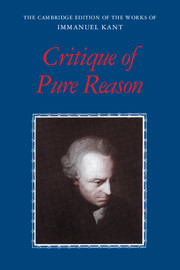Book contents
- Frontmatter
- Contents
- General editors' preface
- Acknowledgments
- Introduction
- Immanuel Kant, Critique of Pure Reason
- Table of Contents
- Motto (added in the second edition)
- Dedication
- Preface (to the first edition)
- Preface to the second edition
- Table of Contents (as in the first edition)
- Introduction (as in the first edition)
- Introduction (as in the second edition)
- I Transcendental doctrine of elements
- Division two. Transcendental dialectic
- II Transcendental doctrine of method
- Editorial Notes
- Glossary
- Index
Introduction (as in the second edition)
from Immanuel Kant, Critique of Pure Reason
- Frontmatter
- Contents
- General editors' preface
- Acknowledgments
- Introduction
- Immanuel Kant, Critique of Pure Reason
- Table of Contents
- Motto (added in the second edition)
- Dedication
- Preface (to the first edition)
- Preface to the second edition
- Table of Contents (as in the first edition)
- Introduction (as in the first edition)
- Introduction (as in the second edition)
- I Transcendental doctrine of elements
- Division two. Transcendental dialectic
- II Transcendental doctrine of method
- Editorial Notes
- Glossary
- Index
Summary
On the difference between pure and empirical cognition
There is no doubt whatever that all our cognition begins with experience; for how else should the cognitive faculty be awakened into exercise if not through objects that stimulate our senses and in part themselves produce representations, in part bring the activity of our understanding into motion to compare these, to connect or separate them, and thus to work up the raw material of sensible impressions into a cognition of objects that is called experience? As far as time is concerned, then, no cognition in us precedes experience, and with experience every cognition begins.
But although all our cognition commences with experience, yet it does not on that account all arise from experience. For it could well be that even our experiential cognition is a composite of that which we receive through impressions and that which our own cognitive faculty (merely prompted by sensible impressions) provides out of itself, which addition we cannot distinguish from that fundamental material until long practice has made us attentive to it and skilled in separating it out.
It is therefore at least a question requiring closer investigation, and one not to be dismissed at first glance, whether there is any such cognition independent of all experience and even of all impressions of the senses. One calls such cognitions a priori , and distinguishes them from empirical ones, which have their sources a posteriori, namely in experience.
- Type
- Chapter
- Information
- Critique of Pure Reason , pp. 136 - 152Publisher: Cambridge University PressPrint publication year: 1998

